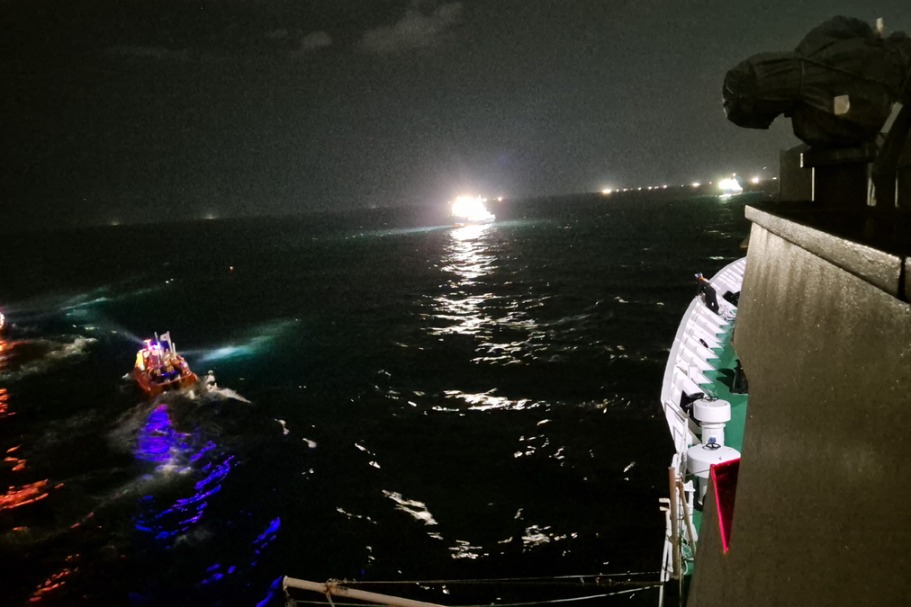US ports remain confident in China-made cranes despite security concerns

Amid mounting scrutiny and an executive order over "national security" concerns surrounding Chinese-made cranes, US ports are continuing to operate and commission them.
US President Joe Biden issued an executive order Wednesday addressing cybersecurity and espionage concerns over Chinese-made cranes in use at American ports. The administration also pledged $20 billion toward infrastructure security over the next five years, including funding domestic manufacturing of cargo cranes.
The initiative targets ship-to-shore cranes manufactured by Shanghai Zhenhua Heavy Industries Co (ZPMC), an engineering company and the world's largest manufacturer of cranes and large steel structures. The ship-to-shore cranes are used to load and unload containerships.
ZPMC dominates the market with nearly an 80 percent share and in many cases is the only supplier to more than 100 of the world's top ports. At ports in the United States, nearly 80 percent of cranes were made by ZPMC.
US officials have claimed that the cranes may be controlled, serviced and programmed from remote locations and thus can be vulnerable to data breaches. However, the officials have not provided any evidence for cybersecurity incidents associated with the ZPMC cranes.
China has denied the accusations, calling the initiative "entirely paranoia" and an overreach of national security concerns that unfairly target Chinese companies and products.
Despite US officials' claims of potential vulnerabilities, there have been no reported instances of security breaches involving ZPMC cranes in the US.
Port authorities remain confident in the security of their current equipment. Additionally, media reports claiming ports were ordered to replace Chinese cranes have been dismissed by port authorities themselves.
The Virginia Port Authority has expressed no intentions to replace its ZPMC-made cranes, and port officials have not had any discussions with the federal government about that.
In fact, all 27 of the Port of Virginia's ship-to-shore cranes were manufactured by ZPMC, and the port has just ordered eight more cranes from ZPMC — four to be delivered late this year, and four others set to arrive in August 2025, according to port spokesperson Cathie Vick.
Vick expressed confidence that the cranes are safe and secure, saying that they underwent a detailed forensic cyberanalysis before going online.
She told Virginia Business that there have been no reports of cybersecurity breaches affecting Port of Virginia cranes, and that the federal government has not alerted the port to any instances of cranes in Virginia being used for espionage.
Similarly, the North Carolina State Ports Authority said the Port of Wilmington's cranes are manufactured by?ZPMC, and they have recently conducted a "vulnerability assessment" at the port and found no security issues.
At the Port of New York and New Jersey, the US East Coast's busiest port and one of the top three busiest in the nation, APM Terminals, a Dutch port-operating company, has recently commissioned two state-of-the-art ZPMC cranes, emphasizing increased efficiency and sustainability benefits.
The two cranes are the first of six that are all expected to be operational by the first quarter of 2025.
The decisions echo the American Association of Port Authorities' (AAPA) position. Calling the security concerns "sensationalized claims", the group has repeatedly stated there is no evidence of cranes being used to harm or track port operations.
"Modern cranes are very fast and sophisticated but even they can't track the origin, destination, or nature of the cargo," said the group in a statement.
The lack of concrete evidence of security breaches poses a challenge for the US government in justifying its concerns, while the absence of viable US alternatives makes it difficult for ports to fully abandon ZPMC in the short term.
Despite the focus on fostering domestic manufacturing, it will likely be some time before American-made cranes can compete effectively with ZPMC in terms of cost and performance.
Currently, Chinese-made cranes cost half those of the alternatives, according to the AAPA.

































